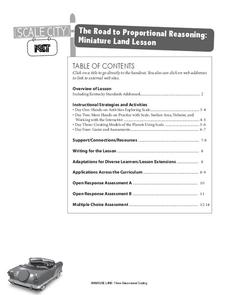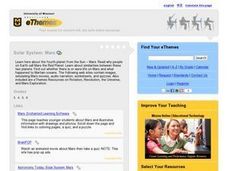Curated OER
Outer Space and Beyond
Students compare and contrast the size, characteristics, composition, and orbits of the planets in our Solar System. They view a PowerPoint presentation, and in small groups conduct Internet research on a selected planet. Each group...
Curated OER
Where Are We Going?
Young scholars practice rounding numbers to ones and tens places, multiplying numbers, and working with simple fractions. They study the placement and distances of planets in the Solar System.
Curated OER
"Space" Investigations
Sixth graders understand the patterns of change observable on Earth as a result of the movement of the different bodies in the solar system. They identify the physical characteristics of the different components of the solar system.
Curated OER
The Path of the Sun: The Ecliptic
Students investigate the celestial sphere and the paths it takes in the solar system.
Curated OER
A Model of the Sun's interior
Students create a three-dimensional model of the sun. In this solar system instructional activity, students design a scale model of the sun using plasticine.
Curated OER
Star Gazing
Third graders investigate what an astronomer is and what he studies in the solar system.
Curated OER
Scientific Theories
Ninth graders compare and contrast how different models can be used to represent scientific understandings. They evaluate the use of data when considering scientific claims. Students debate a variety of socio-scientific issues and the...
Curated OER
Moon Journal
Young scholars review the planets and major moons in the Solar System. In groups, they research and describe the various phases of the moon. They record their observations of the moon phases over a specific period of time and use the...
Messenger Education
Look But Don’t Touch—Exploration with Remote Sensing
Mars is home to the tallest mountain in our solar system, Olympus Mons. In this set of two activities, learners review geologic land formations through the analysis of aerial maps. They then apply this knowledge to aerial maps of objects...
University of Colorado
Are All Asteroids' Surfaces the Same Age?
There are more than 600,000 asteroids in our solar system. Pupils analyze images of two asteroids in order to determine if they are the same age. They count craters for each asteroid and compare numbers.
Kentucky Educational Television
The Road to Proportional Reasoning
Just how big would it really be? Young mathematicians determine if different toys are proportional and if their scale is accurate. They solve problems relating scale along with volume and surface area using manipulatives. The...
Curated OER
Planetary Poster
Learners engage in a study about the planets and create a poster as one of the projects during the study. They create individual charts for mapping the solar system so the locations can be found in mock space missions to other planets.
Curated OER
Clip the Face
Students discover the moon's phases and the rarity of eclipses. In this lunar lesson plan, students view a video titled Spin Around the Solar System: A Moon Dance, which demonstrates the key differences between a lunar and solar eclipse....
Curated OER
Walk a Mile in your Orbit
Students create an awareness of the distance between the planets and the complexity of the solar system through a model of an active solar system. they incorporate physical education and math with the ability to convert distances of each...
Curated OER
Star Words
Students identify and categorize apostrophes. They create maps of the solar system and write simple sentences using apostrophes that describe each planet's characteristics.
Curated OER
Glowing Glimpses of Our Universe
Learners will complete hands-on space activities. In this space science lesson, students will create a glow-in-the-dark model of the solar system, visit a planetarium, make star pictures, and paint constellations. Activities are meant to...
Curated OER
Destination Mars
Students study Mars and what it would take to man a mission there. In this solar system lesson students view a video and complete an art activity in groups.
Curated OER
Hyperstudio Solar System Review: Technology, Study Skills
Students use Hyperstudio to review important points before taking a test at the end of a study unit on the solar system. This concept could easily be switched to many different topics.
Curated OER
Outer Space and Cyber Space
Fourth graders learn about the Solar System while they use mean, median and mode to explore the characteristics of the planets. Students web publish expository writing.
Curated OER
Exploring Mars
Students, working in small groups construct scale models of the planets and solar system. They examine images of Mars and discuss what might have caused the features. They record facts about their planetary research in their journals and...
University of Colorado
The Moons of Jupiter
Can you name the three planets with rings in our solar system? Everyone knows Saturn, many know Uranus, but most people are surprised to learn that Jupiter also has a ring. The third in a series of six teaches pupils what is around...
Teach Engineering
Designing a Spectroscopy Mission
In this mind-bending activity, young engineers explore this question of whether or not light actually bends. Using holographic diffraction gratings, groups design and build a spectrograph. The groups then move on research a problem...
Curated OER
Solar System: Mars
Students research Mars, read why it is called the Red Planet and find out whether there is or was life on Mars.
Curated OER
Introduction to the Planets
Students become familiar with the members of the solar system and planetary order. They identify differences and characteristics of individual planets. Finally students visualize the great size of the solar system and make the image more...
Other popular searches
- Planets of the Solar System
- Planets and Solar System
- Planets Solar System
- Planets in Our Solar System
- Planets in the Solar System
- Science Planets Solar System
- Planets and the Solar System

























